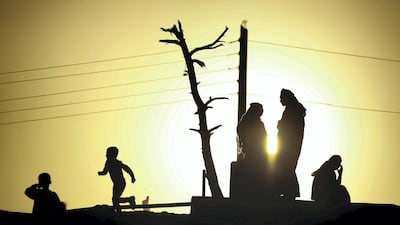Western security sources said that ISIS was resurgent and was using the coronavirus crisis to rebuild its strength for an offensive.
The terrorist group has capitalised on the confusion and chaos caused by the pandemic to recruit and rearm, the sources said.
With the US distracted by the crisis and in the process of pulling troops from the front lines in Afghanistan, pressure on the extremists has eased, allowing them to regroup.
This month, ISIS attacked Iraqi paramilitaries, killing at least 10 people.
The assaults included a bomb planted in the path of reinforcements and the use of boats to outflank security forces.
"You cannot take your eye off the ball with these people as they have not gone away," a western security source told The National.
“They are resurgent. They’re not at their high point by any means, but their trajectory is going up, whereas a couple of years ago it was going down, and Covid is certainly making it a bit difficult to keep a lid on Daesh.”
ISIS is continuing to exploit refugee camps for training, influence and radicalisation, in particular the 70,000 people in Al Hol in north-east Syria.
The militants are well funded and used "significant" numbers of women to co-ordinate their activities.
“They are enabling these attacks and the opportunity from Covid to recruit, train and get back on the front foot,” the security source said.
“Daesh is now going back to traditional sleeper cells, gradually building up its strength. There is also no shortage of money.”
Since the pandemic struck, ISIS has started firefights with Iraqi security forces rather than using roadside bombs and snipers.
“They’re bolder, more aggressive,” a western diplomat told International Crisis Group analysts for a report published this month.
“They use IEDs but more and more they engage in firefights. And they kill.”
But Iraqi Brig Gen Yahya Rasool played down reports that the terrorist group was resurgent.
“You have some remnants of the organisation, cells, that try to carry out operations here and there, in desert areas like western Anbar or on plains, ravines and mountains – areas where the nature of the terrain is difficult, which are hard to totally control," the Iraqi defence spokesman told Crisis Group.
Coalition forces have continued to provide aircraft and drone support for Iraqi soldiers in the past month.
But there were growing concerns that a weakening of Iraq's relationship with Washington had emboldened the terrorists.
The US has had a presence in Iraq since it invaded in 2003, but President Donald Trump has insisted on reducing troop numbers, which has taken pressure off the extremists.
With Iran providing precision missiles to its proxies in Iraq, US troops were under greater threat and were now relying on air support for protection.
It was understood that the Americans were also pursuing the offensive against ISIS with “less energy”, the security source said.
Tension between the US and Iraq has also been high after the assassination of Iran’s Qassem Suleimani in Baghdad by a US drone in January.
There was also a perceived failure in the West to understand the implications of killing Iraqi paramilitary leader Abu Mahdi Al Muhandis alongside Suleimani.
“The Iraqis were seriously annoyed,” the security source said. “He was the main connection with the government and he was a key player.
"Fortunately, now that Iraq has a new government, the ability for the US and Iraq to talk is getting stronger.
"Meetings are planned for next month about the future of the coalition.”
America faces further hostility with Iraqi opponents calling its presence an “occupation” and a heated debate over whether its troops should be expelled.
ISIS is also exploiting the fact that joint operations between Kurdish peshmerga fighters and Iraqi security forces are not as co-ordinated as in the past.
With Iraqi security forces distracted by enforcing coronavirus measures, ISIS in March urged its followers to use it as an opportunity to step up attacks.
With low oil prices and spreading Covid-19 infections, Iraq’s new government faces a testing summer.
ISIS is unlikely to extend its reach to the size of its self-declared "caliphate" of five years ago but there is real concern about its resurgence.
“It’s clear something is happening,” one western diplomat said.


